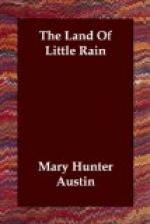It is a pity we have let the gift of lyric improvisation die out. Sitting islanded on some gray peak above the encompassing wood, the soul is lifted up to sing the Iliad of the pines. They have no voice but the wind, and no sound of them rises up to the high places. But the waters, the evidences of their power, that go down the steep and stony ways, the outlets of ice-bordered pools, the young rivers swaying with the force of their running, they sing and shout and trumpet at the falls, and the noise of it far outreaches the forest spires. You see from these conning towers how they call and find each other in the slender gorges; how they fumble in the meadows, needing the sheer nearing walls to give them countenance and show the way; and how the pine woods are made glad by them.
Nothing else in the streets of the mountains gives such a sense of pageantry as the conifers; other trees, if there are any, are home dwellers, like the tender fluttered, sisterhood of quaking asp. They grow in clumps by spring borders, and all their stems have a permanent curve toward the down slope, as you may also see in hillside pines, where they have borne the weight of sagging drifts.
Well up from the valley, at the confluence of canons, are delectable summer meadows. Fireweed flames about them against the gray boulders; streams are open, go smoothly about the glacier slips and make deep bluish pools for trout. Pines raise statelier shafts and give themselves room to grow,—gentians, shinleaf, and little grass of Parnassus in their golden checkered shadows; the meadow is white with violets and all outdoors keeps the clock. For example, when the ripples at the ford of the creek raise a clear half tone,—sign that the snow water has come down from the heated high ridges,—it is time to light the evening fire. When it drops off a note—but you will not know it except the Douglas squirrel tells you with his high, fluty chirrup from the pines’ aerial gloom—sign that some star watcher has caught the first far glint of the nearing sun. Whitney cries it from his vantage tower; it flashes from Oppapago to the front of Williamson; LeConte speeds it to the westering peaks. The high rills wake and run, the birds begin. But down three thousand feet in the canon, where you stir the fire under the cooking pot, it will not be day for an hour. It goes on, the play of light across the high places, rosy, purpling, tender, glint and glow, thunder and windy flood, like the grave, exulting talk of elders above a merry game.
Who shall say what another will find most to his liking in the streets of the mountains. As for me, once set above the country of the silver firs, I must go on until I find white columbine. Around the amphitheatres of the lake regions and above them to the limit of perennial drifts they gather flock-wise in splintered rock wastes. The crowds of them, the airy spread of sepals, the pale purity of the petal spurs, the quivering swing of bloom, obsesses the sense. One must learn to spare a little of the pang of inexpressible beauty, not to spend all one’s purse in one shop. There is always another year, and another.




